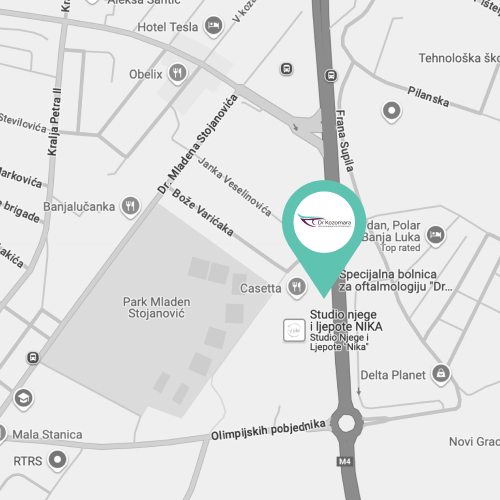
FARSIGHTEDNESS OR HYPEROPIA (TREATMENT, SYMPTOMS AND CAUSES)
Are you interested in what is farsightedness or dioptre plus, what are its causes, how to recognize the symptoms that indicate dioptre plus, and how is this health problem treated? In the text that follows, we provide answers to the above questions, as well as additional explanations regarding the types of farsightedness, elderly farsightedness, children’s farsightedness, as well as the treatment of dioptre plus naturally.
What is farsightedness?
Farsightedness or hyperopia is when you can clearly see things that are quite far from your eyes, and those things that are close to you you see dimly. The professional name for farsightedness is hyperopia, and according to certain studies conducted by the American Institute of Eye Health, 5-10% of Americans suffer from hyperopia. In our country, hyperopia is also known as diopter plus.
In order to better understand farsightedness, it is very important to understand how the normal eye works. Two parts of the eye are responsible for focusing, namely the cornea and the lens. The cornea is the transparent, front part of the eye, and the lens is a structure inside the eye that changes shape depending on how the eye focuses on an object.
The cornea and lens work together to bend and refract light. That light is then focused on the retina, which is located at the back of the eyeball, and receives visual information that it sends to the optic nerve, which transmits it all the way to the brain, and that’s how we see the image.
Diopter plus – causes
A perfectly shaped and rounded lens allows us to see a perfectly clear and focused image, but if the cornea is of a different shape, your eye will not focus the image in the right way. Farsightedness or dioptre plus has various degrees that depend on the eye’s ability to focus on nearby objects. If you can clearly see only objects that are very far away from where you are standing, it means that you are seriously farsighted.
A cornea that is flat can be a cause of dioptre plus, and you can also be farsighted if the eyeball is shorter than it should be because it causes light to focus behind the retina instead of on the retina itself as it should.
Likewise, farsightedness or dioptre plus is in most cases hereditary and if your parents had or have dioptre plus there is every chance that you will have it too.
Farsightedness – symptoms
If you have farsightedness, you should notice some of the following symptoms:
- Farsightedness causes you to have trouble focusing on objects that are close to you
- Headache is a very common symptom of farsightedness
- A symptom of farsightedness is blurred vision
- Fatigue or headaches after performing tasks that require seeing objects that are close are other symptoms of farsightedness. For example, working at the computer or reading a book.
If you have any of these symptoms, and you already wear glasses or contact lenses, you may need a new examination and a new prescription. In case you need an ophthalmologist’s examination, you can schedule your appointment by clicking on this link.
Farsightedness – types
Farsightedness is characterized by two basic types – one is called hyperopia, which is genetically determined, and the other is called presbyopia, i.e. farsightedness that comes with age.
Age-related farsightedness, or presbyopia, develops when the lens inside the eye somehow hardens, and when the muscle connected to the lens weakens. Presbyopia is a normal aging process and cannot be prevented, and living with presbyopia usually means difficulty in performing everyday tasks such as reading, chopping vegetables... It is usually treated with glasses, and this type of farsightedness can also be treated. surgically. Before any treatment, it is important that you understand the difference between traditional farsightedness known as hyperopia and presbyopia.
Presbyopia can also cause objects that are far away from the eye to appear blurry, but unlike hyperopia, you can’t blame it on the shape of the eye, but on genetics. Presbyopia develops with age, because as the organism ages, so does the eye, and it becomes increasingly difficult for the eye to focus on things close to our face.
These two types of farsightedness are different, and so are the ways in which they are developed and treated.
Treatment of senile diopter or presbyopia
Presbyopia or senile diopters can be treated using glasses that you will receive after the ophthalmologist determines the correct diopters during the examination. Some people opt for bifocals where the upper part of the lens is made to help you see at a distance and the lower part is made to help you see up close nature is for those who have both diopters. Bifocals can be very practical because you can wear them all day, but you should be careful when doing things like driving.
In most cases, they are the first solution when it comes to elderly diopters because they are easily available and do not carry any bad side effects.
Another way to treat presbyopia is surgical procedures that can permanently change the shape and structure of the eye, and the most common is laser eye surgery, which removes a certain amount of the cornea so that light can ideally move through the eye. Another type of surgery that is used is to replace the natural lens with a new one which should solve the problem of senile diopters. In these operations, bifocal glasses are most often installed.
Treatment of hyperopia
When it comes to the treatment of farsightedness that is not senile diopters, there are also three ways you can treat it, namely: glasses, laser surgery, or contact lenses. After the ophthalmologist confirms your farsightedness after all the examinations, he will explain to you which are the best options for you and why. In case you need an ophthalmologist’s examination due to the diagnosis of farsightedness – you can schedule your appointment here.
Diopter Plus in children
Children are born farsighted and as they grow, so does their sight, which means that farsightedness declines until it disappears completely, by the adolescent years. If the farsightedness does not disappear by then, there is every chance that the child will be farsighted for the rest of his life. The ability to focus in children is greater than in adults and is generally sufficient to compensate for poor farsightedness and enable them to see close objects well. Despite this, if the child has to really try to focus on the subject, it can lead to strain, and eventually to a headache.
How to recognize farsightedness in children?
Children are generally not aware that they have a vision problem, so you need to pay attention to the signs that could indicate that a problem exists. If you notice any of the following symptoms, be sure to take your child to an ophthalmologist for an examination:
- Headaches
- Endotropia – strabismus in which one eye is turned inward. It can be fully or partially corrected.
- Eye pain, burning, and tearing prompt the child to rub the eyes, squint, or frown.
- Problem with reading and writing.
When it comes to children, it is not always necessary to correct farsightedness. The most common treatment used to treat diopter plus in children is optical correction with glasses. If the diopter plus for the child’s age is very large and causes the above symptoms, in that case, the correction will be necessary. Depending on the age of the child and how well he is able to cooperate, contact lenses can also be used, which the child can use for sports activities or in cases of angiometropia, a significant difference in eye gradation.
Farsightedness – natural treatment
One of the biggest problems with the condition of farsightedness or dioptre plus is that it sometimes comes without any symptoms, which means it can go a long time without treatment. Although glasses, lenses, or surgery are the only things that will help you see better, there are some habits you can change that will help you influence the causes of dioptre plus.
To begin with, it is very important to take in enough vitamins and minerals, antioxidants, and fatty acids and to drink enough water during the day.
In addition to proper nutrition for the health of your eyes, it is very important to rest enough during the day. Unlike the rest of the body, the eyes work around the clock. If your legs hurt, you will certainly sit or lie down to rest, if your hands hurt, you will relax them, but when our eyes are tired we generally continue to use them. And that’s why it’s very important to take short breaks during the day and simply rest your eyes.
Dr. William Bates was an American ophthalmologist who devised exercises to strengthen the eye muscles that will also help your eye health. Let’s mention two exercises.
During the first exercise, you need to cover your eyes with your palms, but before that, rub them to warm them up. After that, put your palms on your eyes to make it completely dark, but not to put pressure on your eyes. Take a deep breath, relax, and concentrate on the darkness. Repeat this exercise every day for at least 10 minutes.
The second exercise involves focusing on an object that is far away, it can be a tree across the street or a chair at the other end of the room. After that, sway from side to side while your focus is constantly on the same object. While doing this exercise it is very important that you blink to keep your eyes moist.
Speaking of blinking, don’t forget to blink when doing things that require special focus, such as working at the computer, because blinking rehydrates the eye and gives it a temporary rest.
We hope that with this text we have managed to answer all your potential questions and doubts you had regarding the state of farsightedness or dioptre plus. Below we recommend you to read: Dioptre minus or myopia (CAUSES, SYMPTOMS, TYPES, AND TREATMENT)
Make an appointment with an ophthalmologist by clicking this link..
Take our quick test to find out if laser eye surgery is your path to glasses-free vision
Not all laser eye surgery options are the same. Find out which one is right for you by taking our quick 2-minute self-test
Our most popular procedures
What our patients say...

★ ★ ★ ★ ★
“All praise, expertise and kindness of the entire staff headed by Kozomara
"

★ ★ ★ ★ ★
“I turn to Kozomar ophthalmology with great pleasure, even though I came from Slovenia for their services. I am extremely grateful for their professional treatment during diopter removal and blepharoplasty. Every time I am impressed by their dedicated and precise work. I would especially like to emphasize the respectable attitude of the entire staff”

★ ★ ★ ★ ★
“All the best! Very satisfied with everything, from the appointment, examination, operation and control. Thank you to the doctor and the whole team for their expertise and kindness!!!”

★ ★ ★ ★ ★
“It is with great pleasure that I thank the entire staff and dr. Kosamora. I am very satisfied with the service, I came yesterday with very poor eyesight. They restored my vision to 100% painlessly, quickly and professionally. I recommend this clinic to everyone and THANK YOU very much. Sincerely, Adnan Jusić.”

★ ★ ★ ★ ★
“Congratulations, I've done several procedures so far, from aesthetics to vision correction. I'm over the moon! Kudos!”

★ ★ ★ ★ ★
“Very friendly staff, medical specialists and technology of the highest quality”

★ ★ ★ ★ ★“I found out about the clinic from a friend. The professionalism during the examination and the kindness of the entire staff, after two or three days they create an almost friendly relationship with the patients.”

★ ★ ★ ★ ★“Laser dioptre removal done in 3/23. Service at the level, wonderful and very kind staff. Everything was as it was said at the examinations. Clear vision from the first day, thank you from the bottom of my heart! ????”

★ ★ ★ ★ ★
“Excellent team, kindness and professionalism! All recommendations!”

★ ★ ★ ★ ★
“Very friendly and competent team!
Dr. Kozomara, himself is a top professional! I felt very well looked after. Was fully explained. I've been watching in HD quality for a few days now
Thank you very much!!!”
We have replaced the images of the actual patients who provided these testimonials to protect their privacy

